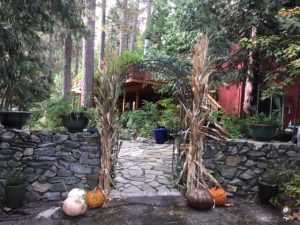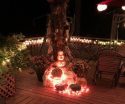Autumn is my favorite season of the year. The sun, at a softer angle, filters through the brilliant foliage and lights up the landscape in stunning colors of amber, red, yellow and gold. It is a beautiful display by Mother Nature. Flocks of tourists make the pilgrimage to New England every October and November to see the turning of the leaves. They are called “leaf peepers” back East and they travel thousands of miles to see the show.
Although it isn’t quite so spectacular on the West Coast, there are many areas where autumn puts on a lovely display. In Sonora the crape myrtle trees burst into fiery colors and dot the landscape with reds and ambers. But as you travel up the mountains of the Sierra, the foliage becomes more and more evergreen. The oaks and dogwoods of the foothills give way to the pines and cedars at higher elevations. In my garden, at 4,400 feet, I still have oaks and dogwoods, but most of the trees are evergreen.
My solution has been to plant trees and shrubs that turn colors in fall. Dogwoods turn a beautiful pink, Japanese maples turn red or yellow, depending on what variety you plant, and the Chinese pistache (Pistache chinensis) turns a neon red-orange to light up the garden.
As the warm days and crisp nights of autumn stop the manufacturing of chlorophyll in these plants, a kaleidoscope of colors surface and create a palette that is breathtaking.
Autumn joy sedum (Sedum herbstfreude) is an excellent plant for the mountains and weathers the snow very well. Its flowers are a dusty pink at the end of the summer and beginning of September, and then they turn russet in mid-to-late September. Burning bush (Euonymus alatus) turns bright red in the fall and looks like it is on fire. (Although this plant is invasive in the Eastern United States, it is not listed on the California Invasive plant list.)
There are quite a few California native trees and shrubs that also have beautiful fall colors. Quaking aspen (Populus tremuloides), black oak (Quercus kelloggii) and barberry shrubs (Berberis), to name a few.
Every fall I go along the road and gather yellow and amber oak leaves to start my decorations for the season. I buy corn stalks and pumpkins and begin my “autumnal shrine.” Some of my pumpkins are ceramic and, along with lots of gourds and haystacks, my decorating begins.
I thread twinkle lights through the corn stalks and light up the ceramic pumpkins. Bright red leaves of the Tupelo tree and yellow maple leaves are all mixed in as a matrix for the gourds to lie on. I begin at the opening stone wall of my garden with the display, continue decorating on the deck and finish with a big display in the house.
The displays in my house and garden are my tribute to the holiday season and make a nice backdrop for my yearly Thanksgiving dinner. Especially at night, when everything is lit up, the house becomes a cornucopia of autumn’s plenty.
Happy holidays!
Francie McGowan is a University of California Cooperative Extension Master Gardener of Tuolumne County.
UCCE Master Gardeners of Tuolumne County can answer home gardening questions. Call 209-533-5912 or go to: http://ucanr.edu/survey/survey.cfm?surveynumber=7269 to fill out our easy-to-use problem questionnaire. Check out our website at: http://cecentralsierra.ucanr.edu/Master_Gardeners/You can also find us on Facebook, or pick up the local Master Gardener book “Sharing the Knowledge: Gardening in the Mother Lode” at Mountain Books or the UCCE Office both in Sonora, CA





